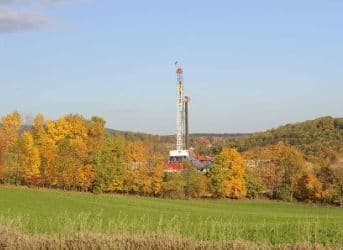“Shale perspectives” in Eastern Europe are challenged by delaying tactics of industry majors. Media coverage of shale gas development is positive but in Lithuania and Poland global oil & gas companies one by one drop bids to explore for unconventional. Lack of business awareness and overdependence on preliminary estimates of shale reserves may lead to the same result in Ukraine.
U.S. energy major Chevron, the only bidder to explore for unconventional hydrocarbons in the 1,800 square km Silute-Taurage field, has pulled out after winning a tender to explore for shale gas in Lithuania. “The fiscal, legislative and regulatory climate in Lithuania have substantially impacted the operational and commercial basis of the investment decision”, announced Chevron representatives. Business risk assessment resulted in the official statement which is highly disappointing for Lithuania’s politicians known for their harsh criticizm of Russian energy supplies. Crippled economy of deindustrialized post-Soviet republic struggling to survive on EU grants and subsidies is in dire need of natural gas for peak-shaving. So what’s to be done to explain the failure to the voters? “Let’s pray for shale gas”, proposed The Baltic Times covering Lithuania’s Speaker of the Seimas Vydas Gedvilas’s shale “road show” in the United States in the beginning of October 2013.
Related article: Europe Taking a Pass on Shale Revolution?

(Euractiv.eu)
Despite the fact that drilling for shale gas poses risks for the nation’s underground water reserves, Lithuanian elites still put high hopes on the possible import of American fracking technology. Rude awakening in Vilnus happened just before another colder-than-normal 2013/2014 winter in Europe. Just in time Lithuania’s leaders got a 20% discount on natural gas prices in recent talks with Gazprom’s officials in Moscow. In return Lithuania’s representatives are, reportedly, committed to buy gas from the east until 2020 and abandon all claims against Russian supplier in European courts. This deal and earlier decision in Vilnus to raise the level of royalties on fracking may seriously hamper future shale projects in the country.
Poland’s shale gas dreams are withering on the vine for similar reasons, writes The American Interest. In 2012 Polish newspaper Gazeta Wyborcza initiated a pro-fracking media campaign full of bold and forward-looking statements. Although in May 2013 Exxon Mobil, Talisman, Marathon and even state run Lotos have pulled out of Polish shale gas, citing difficult geology and short-comings in the regulatory environment. What’s more, the US Energy Information Administration’s latest global survey revised Poland’s technically recoverable shale gas reserves downward by more than 26 percent. Poland’s 46 exploratory wells drilled by various ventures companies couldn’t produce commercial quantities of shale gas. EU court put a period to fracking plans and eventually ruled Polish shale licenses illegal. Hasty promises of energy revolution are left hanging in midair.
Related article: How the 1973 Oil Embargo Still Affects US Energy Agenda Today
Interestingly, one of the leading Russian international energy policy experts Dr. Nodari Simonia (MGIMO) predicted such course of events in summer 2013: “US ConocoPhillips and another forty energy companies arrived to prospect for shale gas in Poland. They promised energy independence to the Polish government and said Polish gas would oust Russian gas from the EU market. In the meantime Exxon Mobil withdrew from Poland in 2012 and ConocoPhillips is thinking so far.”
Ukraine’s dreams of joining the club of fracking nations may also lead to unexpected effects. Unlike neighboring states Ukraine’s local demand is insufficient to create and sustain an unconventional gas boom. There are many examples of political instability and corrupt practices which make large energy industry investments in the country very risky. For instance, last year a small privately-owned company SPK-GeoService suddenly won lucrative shale development tender over three well-financed bidders. Some have tied in GeoService to “The Family,” the shadowy circle around Yanukovych and his two sons, Oleksandr and Viktor.
Finally, Shell’s decision to pour $400 million into the Yuzovskoye field exploration does not mean that shale gas extraction in Ukraine will be profitable. After the turn in business expectations in Lithuania and Poland, there are chances that both Shell and Chevron stakeholders might change their mind. More often than not business interests outbalance politically charged projects.
By. Igor Alexeev


















